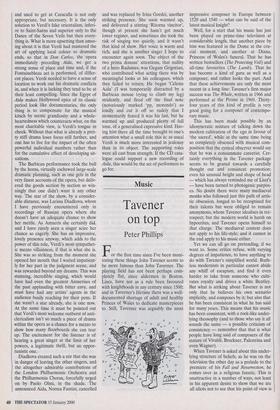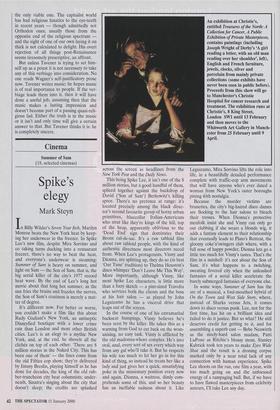Music
Tavener on top
Peter Phillips
For the first time since I've been moni- toring these things John Tavener seems to be more famous than John Taverner. The playing field has not been perhaps com- pletely flat, since aldermen in Boston, Lines, have not as a rule been favoured with knighthoods in any century since 1500; and in Taverner's lifetime there was a well- documented shortage of adult and healthy Princes of Wales to dedicate masterpieces to. Still, Taverner was arguably the most impressive composer in Europe between 1520 and 1540 — what can be said of the latest musical knight?
Well, for a start that his music has just been played on prime-time television at considerable length, that another piece by him was featured in the Dome at the cru- cial moment, and another at Diana, Princess of Wales's funeral. That he has written bestsellers (The Protecting Veil) and all-time favourites (The Lamb). That he has become a kind of guru as well as a composer, and rather looks the part. And that these achievements are only the most recent in a long line: Tavener's first major success was The Whale, written in 1966 and performed at the Proms in 1969. Thirty- four years of this kind of profile is very good going for a composer of contempo- rary music.
This has been made possible by an idiosyncratic mixture of talking down the modern cultivation of the ego in favour of 'the sacred', while at the same time being so completely obsessed with musical com- position that the cynical observer would say that he was a consummate careerist. Cer- tainly everything in the Tavener package seems to be geared towards a carefully thought out and consistent promotion: even his unusual height and shape of head — which has always reminded me of Liszt's — have been turned to photogenic purpos- es. No floubt there were many mediaeval monks who followed just this path of artis- tic obsession, longed to be recognised for their talents but were obliged to remain anonymous, whom Tavener idealises in ret- rospect; but the modern world is harsh on hypocrites, and Tavener opens himself to that charge. The mediaeval context does not apply to his life-style; and it cannot in the end apply to his music either.
Yet we can all go on pretending, if we want to. Some critics refuse, with varying degrees of impatience, to have anything to do with Tavener's simplified world. Ruth- less modernists in particular cannot abide any whiff of escapism, and find it even harder to take from someone who culti- vates royalty and drives a white Bentley. But what is striking about Tavener is not only that he believes his own scenario implicitly, and composes by it; but also that he has been consistent in what he has said for many years. This means that his music has been consistent, with a rock-like under- lying theosophy (and to those who say it all sounds the same — a possible criticism of consistency — remember that that is what people have long said of composers of the stature of Vivaldi, Bruckner, Palestrina and even Wagner).
When Tavener is asked about this under- lying structure of beliefs, as he was on the television the other day as a prelude to the premiere of his Fall and Resurrection, he comes over is a religious fanatic. This is unattractive in a number of ways, not least in his apparent desire to show that we are all idiots not to see that his point of view is the only viable one. The capitalist world has had religious fanatics to the eye-teeth in recent years — though admittedly not Orthodox ones; usually those from the opposite end of the religious spectrum — and the sight of one of our own laying it on thick is not calculated to delight. His overt rejection of all things post-Renaissance seems tiresomely prescriptive, an affront.
But unless Tavener is trying to set him- self up as a priest it is not necessary to take any of this verbiage into consideration. No one reads Wagner's self-justificatory prose now. Tavener writes music: he hopes music is of real importance to people. If the ver- biage leads them into it, then it will have done a useful job, assuming then that the music makes a lasting impression and doesn't become part of a passing quasi-reli- gious fad. Either the truth is in the music or it isn't and only time will give a certain answer to that. But Tavener thinks it is: he is completely sincere.



























































 Previous page
Previous page